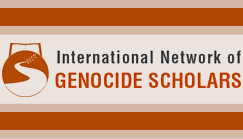Event Title
Social Scientific Research on Ideological and Identity Change in Mass Atrocities
Submission Type
Paper
Abstract
It is now widely accepted that the kinds of ideologies and identities which may become implicated in political violence are not static, but change before, during, and after conflict. Yet while existing research pertaining to ideological and identity change is vast, social scientists lack integrated theories or frameworks for analysing and explaining change in identities and ideologies, particularly surrounding violent atrocities. In this paper, I take some steps towards consolidating existing research on ideological and identity change and drawing out key comparative conclusions relevant to the study of atrocities and post-atrocity transitions, nudging the field towards broad answers to several important questions that should be at the heart of research into atrocities and their aftermath. What imbues certain violence-promoting identities and ideologies with their appeal and power? How do producers of such identities and ideologies win-out over those who champion more inclusive, peace-promoting identities and ideologies? How much agency do individuals have in shaping the course of ideological and identity changes, and are the most influential individuals political and media elites or more ‘grass roots’ activists and organisers? How do processes of violence, conflict and atrocity themselves feedback into ideological and identity changes? Two central arguments run throughout the article. First, changes in ideologies and identities are not reducible to other ‘deeper’ social, political or economic determinants (such as economic downturns, regime instability, institutional weakness or strategic self-interest) as many sceptics of the relevance of identity and ideology might suspect. Second, contemporary research on ideology and identity must embrace a clear theorisation of these phenomena as both psychological and social, or, as I prefer to phrase it, as both internal to individuals (operating through sincerely accepted beliefs, values, and frameworks of meaning) and as an aspect of social structure (rooted in expectations and knowledge about social norms, discourses, institutions and practices).
Biographies

Social Scientific Research on Ideological and Identity Change in Mass Atrocities
It is now widely accepted that the kinds of ideologies and identities which may become implicated in political violence are not static, but change before, during, and after conflict. Yet while existing research pertaining to ideological and identity change is vast, social scientists lack integrated theories or frameworks for analysing and explaining change in identities and ideologies, particularly surrounding violent atrocities. In this paper, I take some steps towards consolidating existing research on ideological and identity change and drawing out key comparative conclusions relevant to the study of atrocities and post-atrocity transitions, nudging the field towards broad answers to several important questions that should be at the heart of research into atrocities and their aftermath. What imbues certain violence-promoting identities and ideologies with their appeal and power? How do producers of such identities and ideologies win-out over those who champion more inclusive, peace-promoting identities and ideologies? How much agency do individuals have in shaping the course of ideological and identity changes, and are the most influential individuals political and media elites or more ‘grass roots’ activists and organisers? How do processes of violence, conflict and atrocity themselves feedback into ideological and identity changes? Two central arguments run throughout the article. First, changes in ideologies and identities are not reducible to other ‘deeper’ social, political or economic determinants (such as economic downturns, regime instability, institutional weakness or strategic self-interest) as many sceptics of the relevance of identity and ideology might suspect. Second, contemporary research on ideology and identity must embrace a clear theorisation of these phenomena as both psychological and social, or, as I prefer to phrase it, as both internal to individuals (operating through sincerely accepted beliefs, values, and frameworks of meaning) and as an aspect of social structure (rooted in expectations and knowledge about social norms, discourses, institutions and practices).





Comments
View the agenda item.